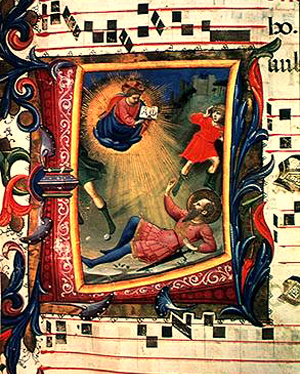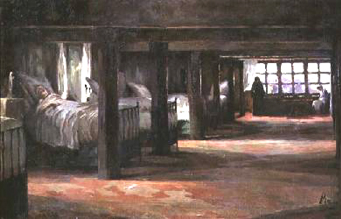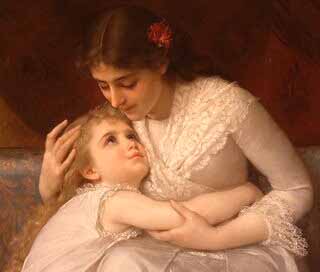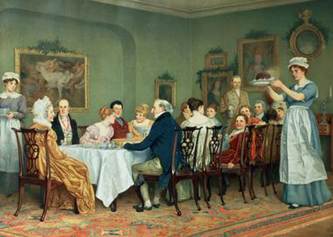 |
Morals
Moral Questions
How to Deal with Apostate and Scandalous
Family Members
Fr. Paul Sretenovic
My articles on Morals have raised a number of eyebrows. There have been numerous persons on both sides of the issues - at times, passionately so. I believe that this is good. A banner has been raised - Catholic Morals is timely and should be enforced against the liberal mainstream - and many people are taking positions in face of it. They cannot be criticized as tepid persons: “But because thou art lukewarm and neither cold nor hot, I will vomit thee out of my mouth” (Apoc 3:16).

The conversion of St. Paul, not a lukewarm soul |
The great St. Paul labored passionately against the Christians for a time, until his conversion, which we celebrated on January 24th. God found much good material to use in Saul and, of course, the rest we all know, since it entered into history. Had Saul been lukewarm, there is a good chance that he would not be known by us and would have lost his soul.
So, those who are passionately against my expositions on Catholic Morals at least have the merit to care enough to take a position. If they have consistency and a desire to fight for their positions, they show they are not relativist persons. They have the potential to change. God can work with them. The worse position is to remain in the same place, revolutionary and indifferent to everything. For the former, I will continue to do my best to help them to understand that what I write is not new: I am trying to echo the teachings of the Church and restore the good customs of Christian Civilization.
Having said this word to my objectors, I embark now on another issue that I have often come upon as a priest and can be useful to my readers.
This is the question: What is the position that members of a Catholic family should take in relation to those in the family who have either apostatized from the faith or live in adultery or illegitimate unions?
1. How the family should treat an apostate member
Before entering the how to, some presuppositions must be laid down.
- The primary end of the marriage as a Sacrament is to populate Heaven, as I explained elsewhere. Thus, the common good of the family is to keep the orthodoxy of the Catholic Faith intact, in an ambience of mutual charity and with the hope to attain Heaven.
- Catholic Doctrine and Morals are the guarantees of the unity of the family through a life of mutual fidelity, protection and obedience.
- When a person does not take the Catholic faith as the center of the family life, one consciously or unconsciously slides toward naturalism, religious indifferentism, and often a practical atheism, living as if God and His Church did not exist.
Now, how to apply these presuppositions? How should a Catholic treat a member of his family who apostatized from the Catholic Faith.?

An ill child is quarantined in the sick room at a Catholic boarding school to not contaminate the others
|
I believe that a Catholic should treat such a person with caution, as if he were contaminated by a contagious disease. Indeed, if a member of the family gets measles, his parents put him in quarantine until the contagious symptoms are over. One should act analogously with a spiritual disease such as the loss of one’s faith. The one contaminated with such an apostasy must be put in quarantine, away from the others, and receive only those who can help to cure him.
I especially counsel you to avoid contacts of the apostate member with your children. Children are like small trees that, when hurt, retain a scar from that wound all their lives. Familiar complacence toward a relative who denies our Holy Faith may mark the psychology of a child forever. He may become a relativist if you treat your apostate relative with the same familiarity as you show to other faithful family members.
Thus, you and the spiritually healthy members of your family should keep a distance from the apostate. I won’t enter here into details, because each case is different. But the general principles are those I expounded. Contact may be kept with the apostate by mature members of the family with the goal of bringing the straying lamb back to the fold.
2. The scandalous member who is adulterous or in an illegal relationship
For sake of clarity, I am using the word adultery as the action of a married man or woman who breaks the sacred vows of matrimony and enters a marital relation - for a while or permanently - with a person of the opposite sex. Illegitimate unions define the situation of an unmarried person who lives in a marital relation with another unmarried person.
I believe that we Americans normally shuffle both situations together: for us adultery often is taken to include all the sins against chastity. It is never too late to make a precision that helps us to better understand Catholic Morals, which is quite subtle. Actually, while an illegitimate union makes a single scandalous sin, adultery adds to this first sin another, the breaking of the vows of matrimony. So the adulterer sins twice.
At any rate, how should members of a Catholic family treat the adulterer or the person having an illegitimate relation?
Here analogous principles of prudence apply, with different consequences.

Especially girls pay close attention to how Catholic Morals are practiced in family situations |
Indeed, it is not rare that ladies assimilate Catholic doctrine more often through morals than through dogmatic study and debate. In many ways this is more fitting to the psychology of women, whose horizon is frequently limited or principally turned toward their family lives. So, if there is a lack of consistency in family behavior and the precepts of the Catholic Morals, they go astray in their fidelity to Catholic teaching.
Hence, the girls of the family are particularly sensitive to a complacence shown toward a sibling or relative who lives a scandalous life. If the parents are rigorous with the scandalous member, the daughters will take Catholic Morals seriously; if they are lax they will considered those moral precepts just a code of convenience, without further consequences.
Thus, be aware that when you take a liberal approach toward this or that sibling or relative who lives in public sin, you are implicitly teaching your children – and especially your daughters – not to take Catholic Morals seriously.
First objection: Strategically speaking, this is a very ineffective way to convert the family member. Instead, we must show the guilty party our love so that he will more readily convert.

Vatican II's mercy to the world harmed the Church. Above, Cardinal Maradiaga performing jazz
|
This objection could be based on the approach Pope John XXIII took at the opening of the Second Vatican Council, when he declared that the Church henceforth would set aside justice and rigor and attract everyone through mercy and goodness. So, the Church effectively dropped the defense of Catholic dogma and Morals and approached those in error.
Unfortunately, as experience has taught us during these tragic 45 years that have followed those words, such a policy did not work well. Instead of attracting everyone to the Catholic Faith, quite the opposite happened: the Church adapted herself to the world, to Protestants, Schismatics, Jews and even to Masons, and has increasingly lost her characteristics. These 45 years of unilateral “mercy” and “goodness” have been the worst in the whole History of the Church.
Mercy without justice is unilateral and incomplete. Both virtues have to come together like the two arms in the body. Scripture tells us that those who were rebuilding the Temple in Jerusalem, after the captivity of Babylon, had to build with one hand and to fight with the other. This is how our balance between mercy and justice should be. Without mercy and goodness we don’t build, but without justice and militancy we don’t keep what we have built.
Translating this to the case at hand, the first mercy to consider is for the family as a whole, which should be raised and formed in Catholic Morals. Thus, to apply justice to the guilty party is to have mercy for the good members who remain faithful. After this first obligation is guaranteed, then and only then, our obligation of mercy to the guilty party comes.
Second objection: Doctrinally speaking, to shun a scandalous member of the family is against charity.
I believe that St. Paul knew well what is or is not against charity. He told us to take the guilty person apart and admonish him once, and then twice - so far we are being charitable. Then, if the person does not change, we must send him away from that community, be it a family, a congregation or an entire society“ (Titus 3:10,11). I stress that this is not just the personal opinion of a great saint like St. Paul. The Epistles he wrote were inspired by the Holy Ghost and, therefore, are God’s voice.
Our modern notion of charity is often soaked with sentimentalism, where one only looks with pity at the guilty member, and not at the ensemble of the family or society that is damaged when one takes a liberal stand toward a scandalous family member.
The discerning man or woman recognizes that the only way to help a loved one is to take a strong, firm stand immediately against the evil and threaten to shun the offending party if he should persist in his bad moral behavior. In this way, he immediately has to face the consequences of his bad decision.
3. Love of God and love of man
In both these instances of apostate or scandalous family members, we cannot forget that the primary object of charity is God. Indeed, the love of God must be the base of our family live: "He that loves son or daughter more than me is not worthy of me" (Matt 10:32). Thus, since the main goal of the family is to please God and we have God’s laws and God’s Church that tell us how to deal with bad members of our families, we cannot place our natural love for the guilty relative above our supernatural love for God.

Only Catholic Morals provides a sound unity in the family
|
We all know that to deny the Catholic Faith and act against Catholic Morals is bad; so does the apostate or scandalous member of our family. Thus, the separation that occurs when a member chooses a scandalous path is a result of his own choice. It is also a sign of his eternal separation from the family and all of God’s children in heaven that will be his lot should he persist in his apostasy until death.
Recall the wise words of Pope Leo XIII in response to the Declaration of the Rights of Man: “About the rights of man as they are called, the people have heard enough, it is time we should hear about the rights of God!” (Leo XIII, Tametsi futura prospicientibus, n. 13, November 1, 1900.) Well, to fail to defend God’s rights over the individual’s in the realm of morals leads one to fall into a kind of moral subjectivism, in which each one has the right to do whatever he wants. With regard to the articles of the Creed, to allow anyone the right to deny the Catholic Faith is equivalent to professing religious indifferentism.
These wrong positions should be avoided at any cost.
Objection: This is correct, but for the sake of family unity, one should tolerate in its midst the apostate and morally scandalous member.
I believe that this is the wrong approach. In appearance it makes the life of the guilty party more comfortable, but actually he will feel himself confirmed in following his wrong pathway and will spread his error to the rest of the family. Remember the classic example of the apple barrel. If you have a rotten apple in your barrel, remove it, or shortly all the other apples will also be rotten.
In conclusion, justice and mercy, like militancy and meekness, are harmonic virtues that should orient our treatment with our families. Finding the correct balance of these virtues is the solution for Catholic behavior in families, which should be the seed of the Reign of Mary.

Posted February 16, 2009

Related Topics of Interest
 The Wife's Position when the Husband Files for Divorce The Wife's Position when the Husband Files for Divorce
 How Grown Children Should Receive Scandalous Parents How Grown Children Should Receive Scandalous Parents
 Divorced Parents, Unwed Mothers Divorced Parents, Unwed Mothers
 Problems of Conscience on Marriages, Live-ins, Baby Showers Problems of Conscience on Marriages, Live-ins, Baby Showers
 A Refresher on Catholic Teaching about Marriage A Refresher on Catholic Teaching about Marriage
 Social Relations between Married Persons and Friends of the Opposite Sex Social Relations between Married Persons and Friends of the Opposite Sex

Related Works of Interest
|
|
Morals | Religious | Home | Books | CDs | Search | Contact Us | Donate

© 2002-
Tradition in Action, Inc. All Rights Reserved
|
 |
|